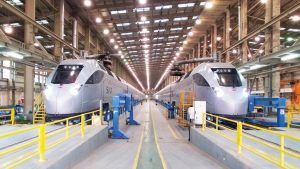 Saudi Arabia Railways (SAR) awarded CAF a train maintenance contract including technical support and other related services at a total value of EUR 200 million.
Saudi Arabia Railways (SAR) awarded CAF a train maintenance contract including technical support and other related services at a total value of EUR 200 million.
The agreement includes performing maintenance work in partnership with the Saudi operator, on the trains CAF that it has supplied in the country over recent years, for a term of five years. These are the units currently running on the North-South line, which connects the capital city of Riyadh to Qurayyat on the Jordanian border, as well as those units running on the East-West line, which connects Riyadh to Dammam. This represents a railway network extending for more than 1,700 km which, in addition to these cities, connects other important areas of the country such as Hail, Al-Qassim and Al-Hofuf.
In addition, the agreement also includes the establishment of a joint engineering department, known as the “Engineering Excellence Centre”, whose purpose will be to train Saudi Arabia Railways staff to provide them with the necessary operating skills to carry out train maintenance, as well as to adapt the Saudi company’s facilities for the overhaul of the main systems of the units as contemplated in this contract. The latter will mean adapting the workshops for bogie and axle maintenance, changing rolling gear, and fitting out specific areas to overhaul engines and pneumatic components.
CAF will be also involved to establish and develop develop strategic agreements with local universities and technical centres to conduct research work and improve railway competences and expertise in the region.
The contract also includes implementing SAR’s “Digital Hub Centre” as a benchmark centre in the Gulf region for train digitalisation, with the aim of developing digital systems and tools for the trains company’s train fleet. This is a project that CAF and SAR have been working on for a number of years.
This project will be based on CAF’s digital train platform, called LeadMind, which provides the possibility of creating a new generation of connected trains and providing more competitive services for operators and maintainers. This process relies on the collection and analysis of data via ongoing remote diagnosis of units, and the subsequent intelligent statistical analysis of the received data flows. This method provides better insight on assets, making it possible to optimise the operation and maintenance strategy, thereby achieving improved rolling stock performance in terms of train availability, reliability and life cycle costs.
Share on:



